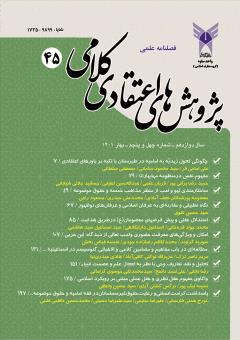نگاه تطبیقی و مقارنهای به عرفان اسلامی و عرفانهای نوظهور
محورهای موضوعی : کلام اسلامی
1 - دانشگاه ساوه
کلید واژه: عرفان, عرفان اسلامی, عرفان های نوظهور, مقارنه, تطبیق,
چکیده مقاله :
تمدّن بشری منجر به بحرانهای کنونی شده است که یکی از آنها، بحران معنویت و نادیده گرفتن رابطۀ انسان با خداست و انسان مغرور از دستاوردهای علمی، تمام همّت خویش را صرف کار، سرمایه و رفاه کرده است. اینک پس از گذشت پنج قرن، دریافته که رفاه و آسایش مادّی نمی تواند به او آرامش دهد و برای پُر کردن این خلاء، به عرفانهای کهن و نوظهور اعم از هندی، بودایی، سرخپوستی و...، روی آورده است. این مقاله در پی این است که با روش تحلیلی و توصیفی و مقارنهای، به بررسی عرفان اسلامی و عرفانهای نو ظهور پرداخته و در مقابل دیدگاه رقیبان که نظریه عینیت و تضاد را ابراز کردهاند، نظریۀ تطابق را پذیرفته و جنبههای تفاوت و تشابه آنها را بیان میکند و در حوزۀ مشترکات آنها به نتایجی رسیده که عبارت است از اینکه هر دو عرفان ، در پی التیام رنجهای روانی و زیبا دیدن جهان و قابل تحمل بودن همه چیز و صلح کل و صحبت از عشق و شادی و آرامش و تحقیر عقل جزئی با یگدیگر مقارن و یار و رفیق بوده؛ ولی فطرت پذیری نه فطرت گریزی، تکلیف مداری بجای بی مسئولیتی ، پاسخ به نیازهای اصلی انسان بجای نیازهای فرعی، حقیقت جویی بجای خرافه پرستی، از ممیّزات عرفان اسلامی در مقایسه با عرفانهای نو ظهور است.
According to the Islamic view, the principle is based on the Human civilization has led to current crises, one of which is the crisis of spirituality and the neglect of man's relationship with God, and man, proud of his scientific achievements, has devoted all his efforts to work, capital and prosperity. Now, after five centuries, he has realized that material prosperity and comfort can not comfort him, and to fill this gap, he has turned to ancient and emerging mysticism, including Indian, Buddhist, Indian, and so on. This article seeks to study Islamic mysticism and emerging mysticism through analytical, descriptive and comparative methods, and in contrast to the views of rivals who have expressed the theory of objectivity and contradiction, has accepted the theory of conformity and aspect. Expresses their differences and similarities and in the field of their commonalities, conclusions have been reached which are that both mysticism, in order to heal the psychological and beautiful sufferings of seeing the world and tolerating everything and total peace and speech From love and happiness and peace and humiliation of a partial intellect, they have been contemporaneous with each other; But instinctability, not instinctualism, orbital duty instead of irresponsibility, responding to the basic needs of human beings instead of secondary needs, truth-seeking instead of superstition, are the distinguishing features of Islamic mysticism in comparison with emerging mysticisms.
قرآن کریم
نهج البلاغه امام علی
طباطبایی ،سید محمد حسین ،اصول فلسفه و رئالیسم، نشر صدرا، 1364ش.
دالایی لاما، بیداری، ترجمه: میترا کیوان مهر.
تمیمی آمدی ،محمّد ،شرح غررالحکم و دررالکلم، شرح محمّد خوانساری، نشردانشگاه تهران، 1373ش.
خویی، شرح نهج البلاغه ناشر: نشر مکتب الأسلامیه، طهران، 1400ق.
یثربی ،سید یحیی ،عرفان عملی در اسلام، نشر معارف، 1383ش.
هرولد بلوم ،فیلد تی.ام دانش هوشیاری خلّاق، ترجمه: بهزاد فرخ سیفی.
کلینی ،محمّد بن یعقوب ، الکافی، تحقیق: علی اکبر غفاری، دالکتب الإسلامیّه، طهران.
دالایی لاما، ژرف اندیشی، ترجمه: مهرداد انتظاری.
کوئیلو پائوتو، کنار رود بیدار نشستم و گریستم، ترجمه: آرش حجازی.
انصاری،خواجه عبدالله ،منازل السائرین، ترجمه: روان فرهادی، انتشارات مولی، 1361ش.
استیس و ت، عرفان و فلسفه، 1379، ترجمه بهاءالدین خرمشاهی، ناشر سروش، چاپ پنجم، تهران
امام خمینی، دیوان امام مجموعه اشعار، 1389، ناشر مؤسسه تنظیم و نشر آثار امام خمینی، تهران، چاپ 55.
اوشو مراقبه هنر وجد و سرور، 1380، ترجمه فرامرز جواهری نشر فردوسی تهران، چاپ اول.
اوشو، ضربان قلب حقیقت مطلق، 1381، ترجمه لوئیز (مرضیه) ناشر فردوس، تهران.
بوعلی سینا، شرح الاشارات و التنبیهات، 1375، نشر البلاغه، قم.
توئیچل پال، اکنکار کلید جهان های اسرار 1382، هوشنگ اهرپور نشر نگارستان تهران، چاپ دوم.
ریاحی، محمد اسماعیل، مطالعات معنوی، 1392، ش 7 نشر پژوهشکده باقر العلوم، قم.
سجادی،سید ضیاء الدین ، مقدمه ای بر مبانی عرفان و تصوف، 1372نشر سمت
شریف رضی، نهج البلاغه، ترجمه محمد دشتی، 1384، مؤسسه تحقیقاتی امیرالمؤمنین، قم.
شریفی احمد حسین، درآمدی بر عرفان حقیقی و عرفان های کاذب، 1389، ناشر به آموز نوبت پنجم، تهران
شوارتز چورجیا، فنگ شویی سالم زیستن، 1383، ترجمه ملیندار اسکندری، نشر ققنوس، تهران.
طاهری محمد علی، موجودات غیر ارگانیک، 1389، نشر بی نا، ارمنستان.
کوئیلو پائولو بریدا، 1381، ترجمه آرش حجازی و بهرام جعفری، نشر کاروان، تهران.
گلسرخی ایرج تاریخ جادوگری، 1377، نشر علم، تهران، چاپ اول.
معین، محمد، فرهنگ معین، 1363، انتشارات امیرکبیر، چاپ ششم، تهران.
ملاصدرا، محمد، الحکمة المتعالیه فی الاسفار العقلیه الاربعه، 1410ق، ناشر دار احیاء تراث العربی، چاپ چهارم.
ملاصدرا، محمد، شرح اصول کافی، تصحیح محمد خواجوی، 1367، مؤسسه مطالعات و تحقیقات فرهنگی، تهران.
مولوی جلال الدین، مثنوی معنوی، 1373، ناشر نگاه، چاپ پنجم، تهران.
مولوی محمد، گزیده غزلیات شمس تبریزی به کوشش محمدرضا شفیعی، 1362، شرکت سهامی ، تهران.
هی لوئیز، شفای زندگی، 1384، ترجمه گیتی قویدل، نشر پیکان، تهران، چاپ 23.

